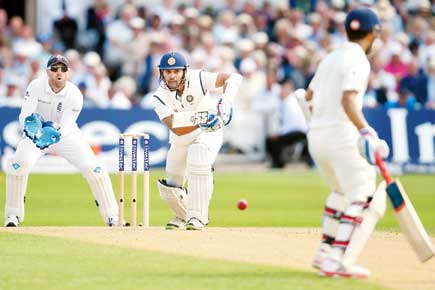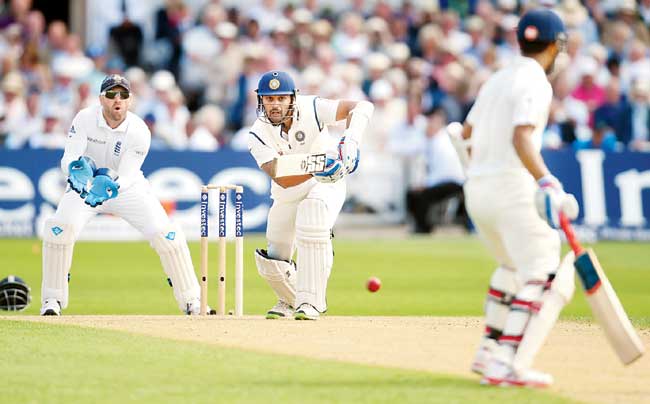When mid-day spoke to a senior groundsman in England, and asked him if the dry weather and sanding the outfield was making a difference, he rubbished the suggestion

India opener Murali Vijay plays the ball past the bowler as England wicketkeeper Matt Prior looks on during Day One of the 1st Test at Trent Bridge on July 9. The pitch came in for heavy criticism for lack of pace. Pic/Getty Images
Southampton: Two Tests into the series, India have been confronted with two of the most contrasting pitches that could possibly have been prepared. One was a low, slow wicket that mirrored many Indian wickets while the other was labelled 'too green' by even some Englishmen.
India opener Murali Vijay plays the ball past the bowler as England wicketkeeper Matt Prior looks on during Day One of the 1st Test at Trent Bridge on July 9. The pitch came in for heavy criticism for lack of pace. Pic/Getty Images
ADVERTISEMENT
When mid-day spoke to a senior groundsman here and asked him if the dry weather and sanding the outfield was making a difference, he rubbished the suggestion.
"Yes, the outfields have sand but the square blocks will always hold moisture, for it has got clay in it. As long as there is proper irrigation on the square, sand cannot suck water out of the square because of the presence of clay. A square can pull water from a wet outfield, but not the other way," he explained.
The pitch at Nottingham wore a dry look even two days before the match, as mentioned by India skipper MS Dhoni. It is still unclear why it was not watered.
One reason being attributed was that it was already very moist underneath and too dry on top, and the grass on it had withered quickly as it was cut too short. The other reason could be the groundsmen were under instructions not to water it.
Going green
But for the Lord's Test, the pitch was nourished with grass. Two days prior to the game, the pitch was covered constantly so that it could retain moisture, and according to the expert it should have been trimmed.
India paceman Bhuvneshwar Kumar celebrates the wicket of England captain Alastair Cook during Day Two of the second Test at Lord's Cricket Ground on July 18. The track there had something for both pacemen and spinners. PIC/Getty Images
Instead, the ground staff brushed it vigorously which, according to the veteran groundsman, could have caused the grass to stand up.
But it also ensured the crust was exposed to the baking sun causing the pitch to dry quicker and aid spin. Although the groundsman has never worked on the Rose Bowl pitch earlier, he has ensured that it would have more carry than Lord's.
He blamed the current dryness of pitches on the amount of cricket that is played on them. "We have school cricket, club cricket, T20s, county, and international cricket. Curators around the country simply don't get enough time to work on the square," he rued.
 Subscribe today by clicking the link and stay updated with the latest news!" Click here!
Subscribe today by clicking the link and stay updated with the latest news!" Click here!






